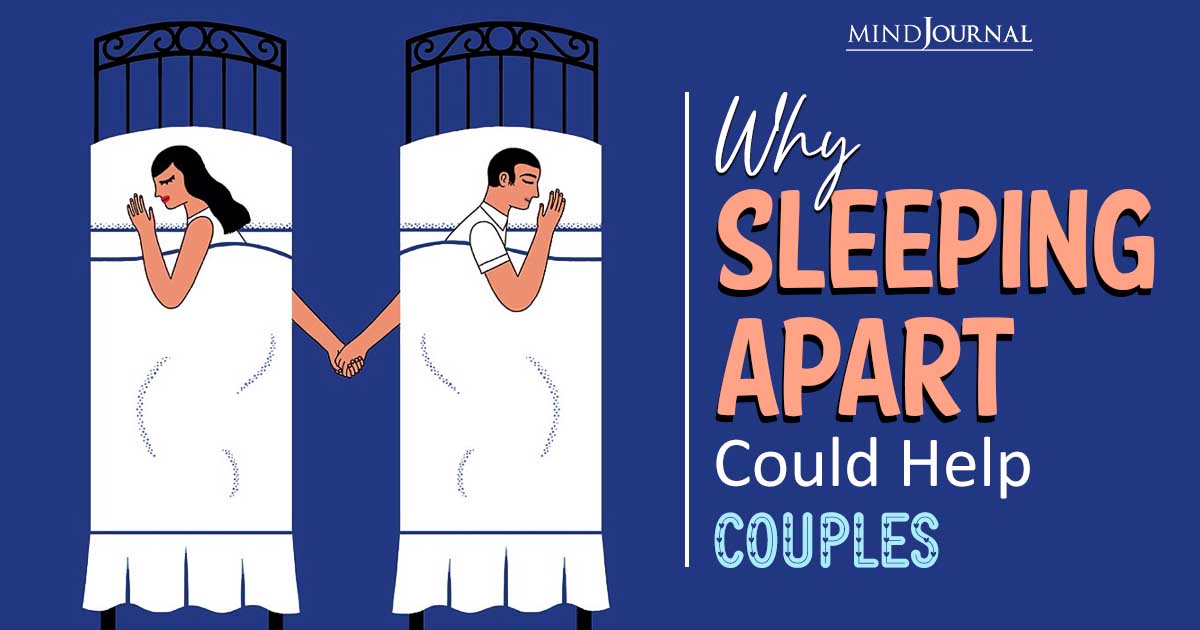In a world where bedtime habits vary, an increasing number of couples are sleeping apart from partners. For those seeking solace in their personal sleep space, the notion of sleeping separately from spouse has gained traction.
Whether driven by different sleep patterns or a need for individual comfort, couples that sleep apart are gradually reaping the benefits of it.
Key Points
- Sleeping apart is often, but not always, beneficial for a couple’s health and romantic experience.
- The impact of temporal and geographical distances on romantic closeness is often quite valuable.
- Compared with a cohabiting marriage, couples living apart experience greater sexual satisfaction.
“Stand together yet not too near together: For the pillars of the temple stand apart, And the oak tree and the cypress grow not in each other’s shadow.” — Kahlil Gibran
Closeness is vital in romantic relationships, but so is distance. Is a separate sleeping arrangement also valuable?
There is an idealized common belief that two lovers merge into one entity. However, this notion of fusion conflicts with the fact that lovers are actually separate from each other and enjoy autonomy. Distance and closeness can be spoken of in several different ways: temporal, geographical, or psychological.
Related: What Your Sleeping Position Reveals About Your Personality
Temporal distance
“In true love the smallest distance is too great, and the greatest distance can be bridged.” — Hans Nouwens
“Only miss the sun when it starts to snow; only know you love her when you let her go.” —”Let Her Go,” Passenger
Can partners cope with temporal distance—that is, can they tolerate waiting? Patience requires the ability to endure waiting, without becoming annoyed or upset, especially when encountering difficulties or frustration.
Conversely, passion is characterized by excitement or agitation and the inclination to feel emotions intensely. Profound lovers are both patient and impatient, as profound love necessitates both the excitement of sexual desire and the calmness of profound love (Ben-Ze’ev, 2019, and here).
The intoxicating feeling of wanting to be with someone all the time is often part of profound love. Here, the togetherness itself has an intrinsic value, since it is fulfilling and enjoyable.
However, this does not exclude the need to have distance that creates personal space, enabling the flourishing of togetherness.

Geographical closeness
“When my marriage was long-distance, I felt good about having my own personal space and I did not have extramarital affairs. After 11 years of marriage, when we moved into our own shared house, I felt that my personal space and freedom were being violated by my husband, as if I was in captivity. At that time, I began to have affairs.” —A married woman
Being physically close to one’s partner is considered essential to romantic love, in part so partners can have a sexual relationship.
Moreover, throughout most of history, a person’s ‘one true love’ was likely to be found not far from where potential partners lived, as this required fewer resources and less effort than long-distance relationships.
An increasing number of today’s romantic couples experience long-distance relationships. A growing body of research indicates that long-distance relationships often have equal or greater value than close-proximity relationships, in promoting and maintaining romantic connection.
In these relationships, couples benefit from greater personal space, which enhances their personal flourishing, as well as the flourishing of their togetherness.
Several studies have shown that communication in long-distance dating is more intimate, more positive, and less argumentative than between partners who live geographically closer together.
Related: What Your Couple Sleeping Position With Your Partner Says About Your Relationship
The percentage of extramarital affairs in these relationships is similar, or even lower than those in standard marriages. Divorce rates also appear to be similar.
Since distance facilitates idealization, people in long-distance relationships tend toward higher levels of optimism and greater idealization of their partner (Bergen, 2006; Jiang & Hancock, 2013; Kelmer et al., 2013; Stafford, 2005).
The value of distance in romantic relationships gains further support in a study by Elyakim Kislev (2020, and here) where sexual satisfaction is examined in different relational frameworks.
These frameworks included couples who were married, never-married who lived apart from their partners, never-married who cohabited with their partners, as well as those who were single and never married.
Marriage, where there was closest proximity to one’s partner, was not found beneficial for sexual satisfaction, while couples living apart but were together, where there was greater physical distance, showed the highest levels of sexual satisfaction.
In our cyber society, geographical distance has lost some of its negative consequences. Sometimes, living apart is more conducive to profound long-term love than living under the same roof; for a growing number of couples, geographical distance promotes emotional closeness. Is (geographical) distance the new (romantic) closeness?
Is sleeping apart beneficial?
“A bed is always for two things only: sleep and sex. When you crawl into bed, one of those two Pavlovian bells should go off.” — Eric Marlowe Garrison
“Sleep separations make many couples appreciate their partner even more once they are together again the next morning. It’s like taking a sleep vacation from each other, then reuniting.” — Wendy Troxel
Sleeping apart, which involves temporal and geographical distance, has become increasingly common—about one-third of American couples sleep apart.
Nevertheless, admitting this sleeping arrangement is still a source of shame and embarrassment, stemming from the prevailing misconception that it reveals a lack of love and closeness.
Common factors that cause couples to sleep apart include snoring, restlessness, parasomnia, frequent trips to the bathroom, or incompatible sleep schedules. These factors damage the quality of sleep, which in turn harms the quality of the romantic relationship.
Poor sleep often results in a poor relationship. In such cases, sleeping apart may improve the romantic quality as well as the sex life of a relationship. Spending every night in bed together may reduce sexual excitement, which is often associated with change and novelty.
Related: 10 Reasons Why Modern Relationships Fall Apart So Easily
There are, of course, opposite examples of couples sleeping apart because of a suffering romantic relationship, and in these cases, sleeping apart may have potential downsides.
The greater role of diversity and flexibility, which characterizes current romantic behavior, is also associated with the greater role of distance in close romantic relationships.
Couples who are able to have a more flexible form of togetherness are more likely to stay together while living (and sleeping) apart.
As in so many other cases, there is no one-size-fits-all sleeping arrangement for all couples. Often sleep is just sleep, a biological need that can be fulfilled in various ways. As in closeness in other romantic circumstances, we sometimes do need distance to make us closer to each other.
Does the heart grow fonder with distance?
“Do we need distance to get close?” — Sarah Jessica Parker
“Absence is to love what wind is to fire; it extinguishes the small, it kindles the great.” —Roger de Rabutin
Despite the popular phrase, “absence makes the heart grow fonder,” both closeness and distance can make the heart grow fonder, as well as make it cold and hostile. Distance adds to our everyday perspective on our romantic relationships.
It can extinguish the weak flame of a candle or stoke a strong romantic fire. Thus, distance is the best way to recover from a broken heart and simultaneously a good way to reassure the hesitating heart.
Too much closeness can prevent you from seeing the virtues of your beloved, in the same way, that covering your eyes with something prevents you from seeing it. But closeness, in the sense of closely interacting with each other, is likely to increase romantic profundity.
However, it is not necessarily the case that couples that sleep together experience healthy togetherness—a main reason can be sleep incompatibility. Sleeping apart is not necessarily a sleep divorce.
As more and more contemporary couples enter long-distance relationships due to work or other considerations, the time apart might save as many marriages as it destroys.
Finding the right distance is crucial for a satisfactory romantic relationship. Distance has its costs but a mutually desired distance can minimize the impact of other negative outcomes.
Related: The 3 Most Popular Sleeping Positions And Their Health Impacts
Determining an appropriate distance is not easy, but doing so eases the enormous burden placed on lovers in intimate relationships. Again, it is a balance that is the bottom line.
This post is partially based on my book, The Arc of Love: How Our Romantic Lives Change Over Time.
References:
Ben-Ze’ev, A. (2019). The arc of love: How our romantic love changes over time. University of Chicago Press. Bergen, K., M., (2006). Women's narratives about commuter marriage. Unpublished doctoral dissertation. University of Nebraska-Lincoln. Kislev, E. (2020). Does Marriage Really Improve Sexual Satisfaction? The Journal of Sex Research, 57, 470-481. Jiang, L. C. & Hancock, J. T. (2013). Absence makes the communication grow fonder: Geographic separation, interpersonal media, and intimacy in dating relationships. Journal of Communication, 63, 556–577. Kelmer, G., Rhoades, G. K., Stanley, S. M., & Markman, H. J. (2013). Relationship quality, commitment, and stability in long-distance relationships. Family Process, 52, 257-270. Stafford, L. (2005). Maintaining long-distance and cross-residential relationships. Lawrence Erlbaum.
Written By Aaron Ben-Zeév Originally Appeared On Psychology Today










Leave a Reply